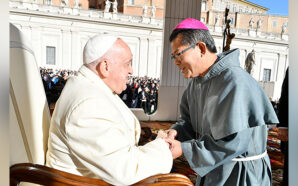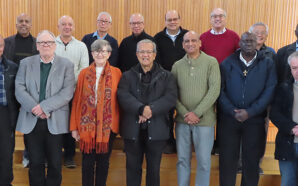Most Reverend Vincent Long Van Nguyen OFM Conv DD STL, Bishop of Parramatta
Homily for the Solemnity of the Ascension of the Lord, Year B and the Ordination to the Diaconate of Menard Gaspi at St John XXIII Parish, Glenwood Stanhope Gardens
Readings: Acts 1:1-11; Ephesians 1:17-23; Luke 24:46-53
11 April 2024
The Church as the living testament of the risen Jesus
Dear friends,
We all have an innate tendency to hold on to that which is familiar and comfortable. We often resist changes that may challenge the status quo and make us feel vulnerable. Uncertainty is the cause of our anxiety even though it can offer an opportunity for learning, adaptation and growth.
Christian scripture and the living tradition of the Church, however, teach us to overcome our fear of the unknown and to discover the God of life and love beyond the familiar patterns, known boundaries and limited horizons. They bear witness to the belief that it is not in holding on the past but in reimagining the future and venturing into the unknown we shall find new life.
Indeed, salvation history is replete with the courage and creativity in responding to chaos and upheaval. Our spiritual forebears learned to deepen their identity as people of faith and open themselves to higher levels of maturity after every major crisis. Thus, whether it was the exodus from Egypt, the exile into Babylon in the Old Testament or the banishment from the Jewish synagogues, the persecution by the imperial forces in the New Testament, and even more recently, the demise of the cultural Christianity, the community of believers found a way to evolve while being faithful to its role of being a vehicle of the kingdom. This is not to say that we have got it right every time. The Synod in Rome and the Diocesan Synod are examples that the reimagining is a work in progress. We are the Church that constantly renews itself for greater mission.
The Ascension inspires us to let go of the familiar and to embrace a new future. It marks a break with the past and a beginning of another era. It focuses on the mission of the Church as the expression of the living power of the risen Jesus. The disciples are challenged to re-imagine their relationship with Jesus in a different way beyond his physical presence. More importantly, they are challenged to take responsibility for their discipleship which is to work for the new future inaugurated by Jesus.
Old habits die hard. Even after the painful lesson of the crucifixion, the disciples still thought of the messianic mission in earthly and political terms. “Are you going to restore the kingdom to Israel?” They ask Jesus. This question reflects their addiction to power and glory. Jesus rejects such a distortion of his vision. He directs them to a kind of messianic mission that would require them to give of themselves to others.
“Go, therefore, and make disciples of all the nations”. This is a command not to conquer and to subordinate but to share God’s radical, inclusive and boundary-breaking love with everyone regardless of his or her race, ethnicity, class, gender and status. Making disciples of all the nations cannot be other than to imbue the world with the spirit of Jesus. It cannot be other than to make his messianic agenda of healing the sick, binding the wounded, lifting up the lowly and releasing the indebted -our own agenda. We Christians cannot live in the world without regard for peace and justice. If we do not make the world a better place than we found it, if we allow ourselves to be indifferent to the suffering world, then we will have forfeited our task of being a changing agent and a leavening force.
Far from retreating into fear and indifference, the Christian movement launched itself forward after the Ascension as a force to be reckoned with in the world, a force not to dominate but to serve, not to rule but to transform from within. In the world where people are motivated by short-term gains, we Christians work on a long-term plan for a shared destiny of hope, communion and life-flourishing for all. This is the work of the Church and the testament of the risen Jesus.
Dear friends,
This evening, we joyfully commend Menard for the grace of diaconal ministry. Menard is no stranger to change, adaptation and transformation. He began his vocational journey as a member of the Two Hearts which was quite a roller-coaster in many ways. Those years of youthful zeal and burning enthusiasm have been tempered with time for deeper reflection, interiority and immersion with God’s people, especially the marginalised. He is being formed to be a vehicle of God’s boundary breaking love. He is being formed to be part of the re-imagining of the Church: one that is less about power, prestige and triumph, but more of a light and leaven of the Gospel to the world. His ordination as a deacon and his commitment to servant leadership give us much hope. Let us pray that we have more of the ordained who wear the smell of the sheep and exemplify the spirit of Christ the true Shepherd.
Let us not be afraid of embracing and enacting the new future inaugurated by Jesus. Let us go out and make disciples of all nations, acting not like a crusaders’ army but like gentle leaven in the dough. We have left behind the powerful Christendom with its penchant for triumphalism, exclusivism, pomp and ceremony. Our task during this time of cleansing and purification is to become what we are meant to be: salt for the earth and light for the world. In the midst of diminishment and powerlessness, we can learn to grow perhaps not numbers but in depth and impact. May the ascended Christ’s promise to be with us be our strength as we carry out his mission on earth.








